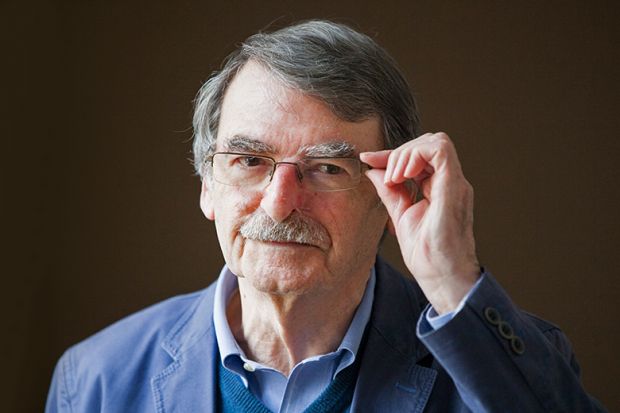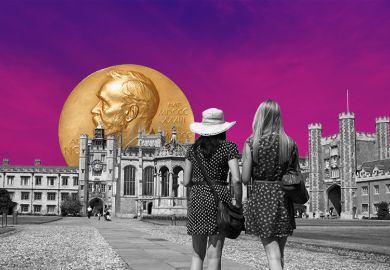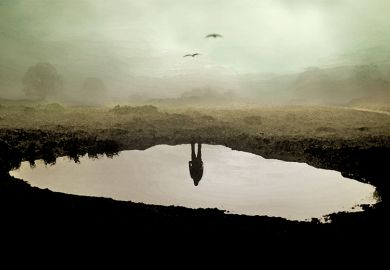With the death of David Lodge at the age of 89, British academia has lost arguably its greatest campus novelist.
Inspired by his career at the University of Birmingham – where he worked from 1960 until 1987 when he retired as professor of English literature to work full-time as a writer – Professor Lodge produced his acclaimed “campus trilogy” – Changing Places: A Tale of Two Campuses (1975), Small World: An Academic Romance (1984) and Nice Work (1988) – satirising academic life, with the books set in and around the fictional University of Rummidge.
He adapted the latter work – which hinges on an “industry shadow scheme” in which a feminist university lecturer who specialises in the Victorian industrial novel is asked to work with the manager of a nearby Midlands engineering firm – into an award-winning BBC drama broadcast in 1989, starring Warren Clarke and Haydn Gwynne.
Changing Places – in which Rummidge English lecturer Philip Swallow swaps jobs with a top-ranking Californian professor Morris Zapp – was partly inspired by Professor Lodge’s experiences as a Harkness fellow in 1960s America, while Small World is set in the world of globe-trotting lecturers on the international conference circuit.
But can Professor Lodge’s best-selling books still be appreciated by an academic sector that has changed so radically since the 1980s? In Professor Lodge’s time at Birmingham, there was no Research Excellence Framework or undergraduate tuition fees, few international academics or students and student satisfaction surveys, while research metrics and equality charter marks were a long way off.
“His ‘campus’ novels, like those of his friend Malcolm Bradbury and my colleague Andrew Davies [like Professor Lodge, an academic-turned-screenwriter], date from what I would call the sexy period of university life, when what went on at campuses seemed glamorous and exciting,” reflected Lincoln Allison, emeritus reader in politics at the University of Warwick, on Professor Lodge’s work.
“This certainly wasn’t true in the 1950s when Kingsley Amis wrote Lucky Jim, and it certainly isn’t true now,” he added, noting how Professor Lodge’s work is set in a specific period between “1964 (opening of the “plate-glass” universities) and 1989 (RAE)”, the forerunner of the REF.
His fiction could be seen as “dated”, said Dr Allison, “but only in the way that good novelists are always dated because they are talking about a particular zeitgeist”.
“Elizabeth Gaskell was one of his role models, and she wrote about Cranford as an eccentric backwater before the railway arrived. It was a lost world before she was in print. Yet the two authors share humour, precision in social history and the capacity to be profound.”
Dr Allison, a fellow Harkness fellow who knew Professor Lodge, recalled him as a “very conventional established professor: collar and tie, dark trousers, linen jacket, serious and modest demeanour without a hint that he was already a successful novelist and scriptwriter”.
“It is ironic that a man who was conservative in his demeanour, personal life and even originally in his religious views should be the leading chronicler of the university at the forefront of the ‘permissive society’. And without hostility too,” he added.
Daniel Moore, head of Birmingham’s School of English, Drama and Creative Studies, said Professor Lodge remained “very much still around and interested in departmental life” until recently as an emeritus professor.
“He had helped to bring through a generation of brilliant scholars – very much those really close textual scholars, colleagues that had real breadth to their work like my PhD supervisor Ian Small, and Steve Ellis who wrote on Dante, Eliot and Victorian literature,” said Professor Moore of Professor Lodge’s impact on his department.
Of his fiction, Professor Moore said Professor Lodge’s novels depict a distinct moment of transition when a “post-war generation who had access to educational opportunities that weren’t there before began to enter academia, where they met older scholars from a more elite world”.
“Birmingham – gently poked fun at as Rummidge – is crucial to Lodge’s work. He’d have been a very different writer if he’d ended up somewhere else,” remarked Professor Moore.
“Works like Small World about the international conference circuit detail a time when academia became international – and Birmingham was very much part of that,” said Professor Moore, noting too that the knowledge partnership scheme of Nice Work – then a fanciful idea for a comic novel – is now commonplace in academia. “It’s a really funny read but we now have many students going out working in charities, media and other industry to bring different sectors together.”
“His works have aged in some respects – how gender relations play out, and the international conference circuit depicted in Small World, when academics were part of the jet set for many years, is different. So many of these events are online these days and I’m not sure they’re quite so important career-wise as they were,” said Professor Moore.
While Professor Moore is an admirer of Professor Lodge’s work, his campus novels depict a very different academia to that faced by today’s academics. “David would found it a very different environment, but his works still capture some of the great things about academic life – some of my best insights have come with those handshake moments at a conference, those fortuitous exchanges that are part of the joy of academia,” he said.
jack.grove@timeshighereducation.com
David Lodge: a personal tribute
Just over two decades ago I took a rickety train along the Sussex coast to visit Henry James’ home in Rye where David Lodge was speaking about his new book.
The novelist joked to a small crowd that when he’d stayed in Lamb House the previous year while researching Author, Author he had proudly announced to his hosts that he was writing a novel about the literary great, expecting surprise, curiosity or even thanks. “Oh we, had a novelist staying here last week – he’s doing the same thing. And another a few weeks back,” remarked his unimpressed interlocutor.
At the time Lodge thought it would be a fun premise for another comic novel, but became more rueful when Colm Tóibín’s sombre read, The Master, was shortlisted for the 2003 Booker Prize – an accolade denied his Henry James effort, and a prize that eluded Lodge, a two-time nominee.
For many like me, Author, Author’s comical treatment of James’s doomed efforts to write a theatrical hit stands as the more memorable work – and is, in my view, his finest novel.
That’s not to say I didn’t devour Lodge’s campus trilogy while at university, revelling in the eccentric and hapless characters that I imagined also filled my English department. Maybe those carefree academics – troubled only by romantic entanglements or where to take their next research sabbatical – didn’t exist at all, but it was nice to think they did.
There was, however, enough edge to his depiction of academia to keep things interesting. In Nice Work, the interactions between the idealistic lecturer Robyn Penrose – who has no idea what a foundry looks like despite having lectured on this subject – and the hard-nosed boss Vic Wilcox are brutally honest but never dismissive of either’s worldview. As Robyn puts it, presciently at one point: “If you try to make universities like commercial institutions, you destroy everything that makes them valuable.”
Lodge’s prodigious output as a literary critic and novelist is one that we might not see from an academic in some time given the difficulty in maintaining such sidelines these days. He was also a brilliant dramatist, adapting Charles Dickens’ Martin Chuzzlewit for an acclaimed 1994 BBC production that kicked off Tom Wilkinson’s career as a major British actor. That series isn’t repeated in the same way as Pride and Prejudice that followed in 1995, but deserves some credit for some of the big-budget Dickens adaptations (Bleak House, Little Dorrit) that followed.
It’s another reason to be grateful for David Lodge – an academic whose writing on campus life, filled with wit, warmth and wry social commentary, enthralled so many.
Jack Grove
Register to continue
Why register?
- Registration is free and only takes a moment
- Once registered, you can read 3 articles a month
- Sign up for our newsletter
Subscribe
Or subscribe for unlimited access to:
- Unlimited access to news, views, insights & reviews
- Digital editions
- Digital access to THE’s university and college rankings analysis
Already registered or a current subscriber? Login








